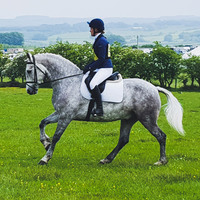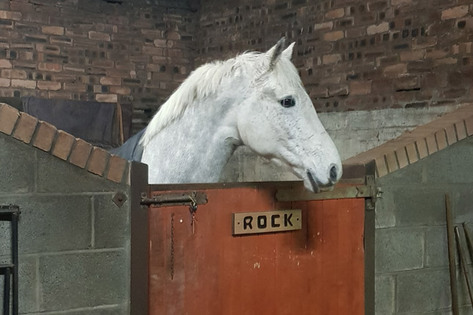
Are You & Your Horse Ready For Bitting Advice? The Steps You Need To Consider First
Equestrian Advice & Guides All Disciplines
Build your business profile for FREE and expose your services to thousands of potential clients!
Create my profile now!
There are probably only a few words or phrases that really strike fear into equestrians: “loose horse”, “strangles” and “box rest”. Hopefully, you’ve not encountered the first two but I’m sure the majority of you will have had a period of box rest at one stage.
To me, there’s two categories of box rest: 'box rest light' and 'box rest'. 'Box rest light' I’d classify as anything up to about 8 weeks. Not great, but completely doable without too much rearranging or hassle, and most importantly, there’s light at the end of the tunnel. 'Box rest' is a whole other scenario! This, I would clasify as long term - upward of 6 months - and quite often with no predetermined end date in sight. I survived 11 months box rest with one horse while still looking after my other, both in DIY. This is truly one of the hardest things you’ll encounter as a horse/pony owner. If you’ve never had to do it, consider yourself very lucky.
Apart from the obvious dilemma of how to keep your horse/pony mentally occupied, there's a whole host of other things to consider:
If your horse/pony is on DIY and you usually go up before work/school, you’ll probably need to factor in an additional 30 minutes. That might not sound that bad until its winter; cold, dark, rainy, windy and you're shattered.
 There are plenty of ways to maximize your time and make your morning visit as efficient as possible, saving any jobs you can for after work/school. Making up breakfasts the night before and covering them so you only have to dampen in the morning saves a few minutes. Making the morning’s hay net up the night before is another great help. If you need to change a dressing or bandage, I’d also leave that until your pm visit. Saving a few minutes on each job really does add up to a big overall time-saving, meaning you can muck out and spend a bit of time with your horse/pony, which they’ll appreciate with a long day stretching ahead of them. If you need to cold hose, this really is a drain on time as its 20 odd minutes where you can’t do anything else. If you can muck out and leave the bed up with your horse standing on mats or move them to a spare stable for the day, this makes the pm visit a bit more manageable for when you have to change the dressing, or add new bedding, or walk in hand etc.
There are plenty of ways to maximize your time and make your morning visit as efficient as possible, saving any jobs you can for after work/school. Making up breakfasts the night before and covering them so you only have to dampen in the morning saves a few minutes. Making the morning’s hay net up the night before is another great help. If you need to change a dressing or bandage, I’d also leave that until your pm visit. Saving a few minutes on each job really does add up to a big overall time-saving, meaning you can muck out and spend a bit of time with your horse/pony, which they’ll appreciate with a long day stretching ahead of them. If you need to cold hose, this really is a drain on time as its 20 odd minutes where you can’t do anything else. If you can muck out and leave the bed up with your horse standing on mats or move them to a spare stable for the day, this makes the pm visit a bit more manageable for when you have to change the dressing, or add new bedding, or walk in hand etc.
 If your horse/pony is on box rest over the summer months it can often be a struggle to get hay or bedding from your usual autumn/winter suppliers. Make sure you source it in plenty of time and that you always have more than you think you’ll need. Even the cleanest horse can suddenly become filthy when they’re stuck in 24/7 and might do a bit of box walking. If your horse is allowed to lie down, it’s also important to give them a generous night time bed to encourage this. If you can pop a lunch time hay net in and do a quick skip out, this really helps in the grand scheme of their mental wellbeing and making your hay and bedding last.
If your horse/pony is on box rest over the summer months it can often be a struggle to get hay or bedding from your usual autumn/winter suppliers. Make sure you source it in plenty of time and that you always have more than you think you’ll need. Even the cleanest horse can suddenly become filthy when they’re stuck in 24/7 and might do a bit of box walking. If your horse is allowed to lie down, it’s also important to give them a generous night time bed to encourage this. If you can pop a lunch time hay net in and do a quick skip out, this really helps in the grand scheme of their mental wellbeing and making your hay and bedding last.
Also, if your horse/pony is on box rest over the summer months it could be a struggle to finance if these are usually your months for saving money on hay and bedding. You might also have to factor in the expense of extra fuel due to going to the yard 2 or 3 times a day, if this is more than usual. You’ll also end up buying toys, licks, extra carrots, apples and turnips to help keep them occupied... and just like time-saving, all these small extras add up.
 There no getting away from the fact that, at some stage, you’ll have the feeling of utter guilt at not having enough time. Not enough time to spend with family, any other horses you have, and the injured horse itself. You’ll feel like you’re constantly in a spin cycle of mucking out, prepping things for the next day, making hay nets, bandaging, and cold hosing. By the time you’ve done all this, you might not have time to spend grooming, and that’s ok. We’re all only human and some days you’ll feel you can only manage the bare minimum and then you need to go home to see your children or other half. This hits especially hard if your box resting over summer. For some reason, in winter, when everyone else is mucking out and not riding, you can almost forget that yours is on enforced box rest and feel kind of normal. But when spring and summer arrive and other horses go out overnight and no one else is mucking out anymore, it’s awful. And it’s ok to have a frustrated cry.
There no getting away from the fact that, at some stage, you’ll have the feeling of utter guilt at not having enough time. Not enough time to spend with family, any other horses you have, and the injured horse itself. You’ll feel like you’re constantly in a spin cycle of mucking out, prepping things for the next day, making hay nets, bandaging, and cold hosing. By the time you’ve done all this, you might not have time to spend grooming, and that’s ok. We’re all only human and some days you’ll feel you can only manage the bare minimum and then you need to go home to see your children or other half. This hits especially hard if your box resting over summer. For some reason, in winter, when everyone else is mucking out and not riding, you can almost forget that yours is on enforced box rest and feel kind of normal. But when spring and summer arrive and other horses go out overnight and no one else is mucking out anymore, it’s awful. And it’s ok to have a frustrated cry.
 Long term box rest is physically and emotionally stressful and exhausting. Not knowing how much longer you have, or knowing that it’s still months when you’ve already done months can be almost soul destroying. Even when I had 2 horses on DIY, I never imagined how hard it would be to muck out essentially 1 extra horse a day and keep this going for 11 months; right from the start of one winter to the start of the next. The early mornings, having to be super organized, the guilt, the expense, the heartache for your poor horse/pony who will, at some stage, hit depression, really does take its toll. Its import to grab any “me” time you can and don’t be afraid to ask for help. We’ve all been there at one stage (or will be) and know how hard it is. I cried grateful, exhausted, happy tears when about 8 months into our 11 months of box rest, I arrived at the yard to find some absolute angel had mucked out my other horse and done my water buckets and hay nets. It was such a kind gesture and little things like that really can get you through longer stints of box rest.
Long term box rest is physically and emotionally stressful and exhausting. Not knowing how much longer you have, or knowing that it’s still months when you’ve already done months can be almost soul destroying. Even when I had 2 horses on DIY, I never imagined how hard it would be to muck out essentially 1 extra horse a day and keep this going for 11 months; right from the start of one winter to the start of the next. The early mornings, having to be super organized, the guilt, the expense, the heartache for your poor horse/pony who will, at some stage, hit depression, really does take its toll. Its import to grab any “me” time you can and don’t be afraid to ask for help. We’ve all been there at one stage (or will be) and know how hard it is. I cried grateful, exhausted, happy tears when about 8 months into our 11 months of box rest, I arrived at the yard to find some absolute angel had mucked out my other horse and done my water buckets and hay nets. It was such a kind gesture and little things like that really can get you through longer stints of box rest.
I honestly hope you never have to do long term box rest as it can take you (never mind the horse/pony) quite a while to recover from. But if you do, you will manage. You’ll discover you can be more organized, stronger and more resistant than you thought possible.

